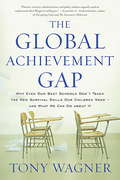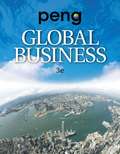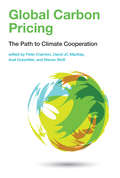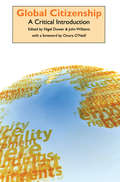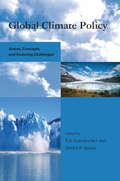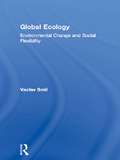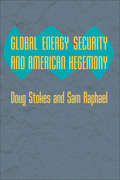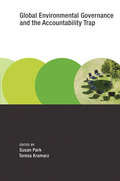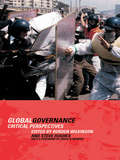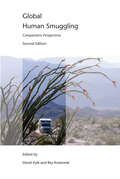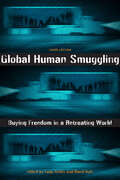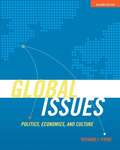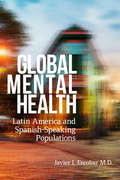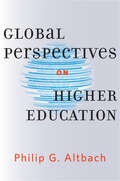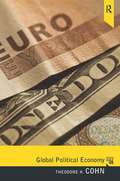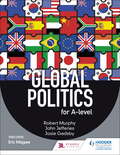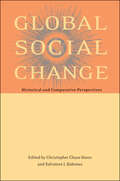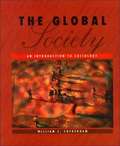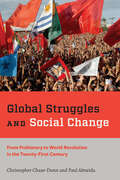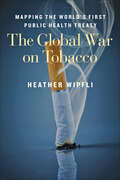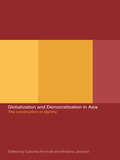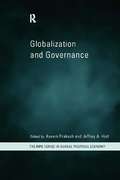- Table View
- List View
The Global Achievement Gap: Why Our Kids Don't Have the Skills They Need for College, Careers, and Citizenship -- and What We Can Do About It
by Tony Wagner"In this persuasive book, Wagner delineates what skills are needed in a globalized era, why most American schools can’t nurture them, and how today’s schools could be transformed to cultivate tomorrow’s skills. ”--Howard Gardner
Global Business 3rd Edition
by Mike W. PengThis edition blends both an institutional-based view and resource-based view throughout every chapter for an unparalleled continuity in the learning process. The book combines an inviting, conversational style with the latest research and examples throughout every chapter. A comprehensive set of cases from Mike Peng and other respected international experts examine how companies throughout the world have expanded globally. All-new video cases, world maps, and unique global debate sections help readers view business challenges from a truly global perspective.
Global Carbon Pricing: The Path to Climate Cooperation (The\mit Press Ser.)
by Peter Cramton David MacKay Axel Ockenfels Steven StoftWhy the traditional “pledge and review” climate agreements have failed, and how carbon pricing, based on trust and reciprocity, could succeed.After twenty-five years of failure, climate negotiations continue to use a “pledge and review” approach: countries pledge (almost anything), subject to (unenforced) review. This approach ignores everything we know about human cooperation. In this book, leading economists describe an alternate model for climate agreements, drawing on the work of the late Nobel laureate Elinor Ostrom and others. They show that a “common commitment” scheme is more effective than an “individual commitment” scheme; the latter depends on altruism while the former involves reciprocity (“we will if you will”).The contributors propose that global carbon pricing is the best candidate for a reciprocal common commitment in climate negotiations. Each country would commit to placing charges on carbon emissions sufficient to match an agreed global price formula. The contributors show that carbon pricing would facilitate negotiations and enforcement, improve efficiency and flexibility, and make other climate policies more effective. Additionally, they analyze the failings of the 2015 Paris climate conference.ContributorsRichard N. Cooper, Peter Cramton, Ottmar Edenhofer, Christian Gollier, Éloi Laurent, David JC MacKay, William Nordhaus, Axel Ockenfels, Joseph E. Stiglitz, Steven Stoft, Jean Tirole, Martin L. Weitzman
Global Citizenship: A Critical Introduction (Edinburgh University Press Ser.)
by Nigel Dower John WilliamsThe idea of global citizenship is that human beings are "citizens of the world." Whether or not we are global citizens is a topic of great dispute, however those who take part in the debate agree that a global citizen is a member of the wider community of humanity, the world, or a similar whole which is wider than that of a nation-state or other political community of which we are normally thought to be citizens. Through four main sections, the contributors to Global Citizenship discuss global challenges and attempt to define the ways in which globalization is changing the world in which we live. Offering a breadth of coverage to the core rheme of the individual in a global world, Global Citizenship combines two factors-the idea of global responsibility and the development of institutional structures through which this responsibility can be exercised.
Global Climate Policy: Actors, Concepts, and Enduring Challenges (Global Environmental Accord: Strategies for Sustainability and Institutional Innovation)
by Urs Luterbacher Detlef F. SprinzAnalyses of the international climate change regime consider the challenges of maintaining current structures and the possibilities for creating new forms of international cooperation.The current international climate change regime has a long history, and it is likely that its evolution will continue, despite such recent setbacks as the decision by President Donald Trump to withdraw the United States from the Paris Agreement of 2015. Indeed, the U.S. withdrawal may spur efforts by other members of the international community to strengthen the Paris accord on their own. This volume offers an original contribution to the study of the international political context of climate change over the last three decades, with fresh analyses of the current international climate change regime that consider both the challenges of maintaining current structures and the possibilities for creating new forms of international cooperation.The contributors are leading experts with both academic and policy experience; some are advisors to governments and the Climate Secretariat itself. Their contributions combine substantive evidence with methodological rigor. They discuss such topics as the evolution of the architecture of the climate change regime; different theoretical perspectives; game-theoretical and computer simulation approaches to modeling outcomes and assessing agreements; coordination with other legal regimes; non-state actors; developing and emerging countries; implementation, compliance, and effectiveness of agreements; and the challenges of climate change mitigation after the Paris Agreement.ContributorsMichaël Aklin, Guri Bang, Daniel Bodansky, Thierry Bréchet, Lars Brückner, Frank Grundig, Jon Hovi, Yasuko Kameyama, Urs Luterbacher, Axel Michaelowa, Katharina Michaelowa, Carla Norrlof, Matthew Paterson, Lavanya Rajamani, Tora Skodvin, Detlef F. Sprinz, Arild Underdal, Jorge E. Viñuales, Hugh Ward
Global Ecology: Environmental Change and Social Flexibility
by Vaclav SmilThe magnitude and rapidity of global environmental change threatens the perpetuation of life on Earth. Many aspects of this crisis are familiar to us - the destruction of tropical rainforests, the hole in the Antarctic ozone, desertification, soil erosion - yet we avoid the underlying challenge of a rapidly deteriorating ecological system and the breadth and complexity of responses demanded. Integrating an analysis of both social and environmental needs, the book explores the premises and problems of different paths towards global management. With its emphasis on flexible response, Global Ecology furthers our understanding of biospheric change and of our abilities and weaknesses in managing the transition to a sustainable society.
Global Energy Security and American Hegemony (Themes in Global Social Change)
by Doug Stokes Sam RaphaelThis analysis of the United States and energy security examines the close relationship between US military supremacy in oil-rich regions and America's maintenance of global power.Energy security generally evokes thoughts of American intervention in the Middle East to protect US interests in that region's oil-rich fields. Doug Stokes and Sam Raphael move beyond that framework to consider US actions in Latin America, Central Asia, and Africa. Drawing on State and Defense Department records and other primary sources and previous scholarship, they show how US foreign policy since World War II has sought to maintain a global energy security regime that supports the nation's allies while maintaining American hegemony. Stokes and Raphael explain how US intervention in energy-rich states insulates and stabilizes those nations' transnationally oriented actors and political economies and why American oil diversification strategy strengthens the country's position against rivals in the global capitalist system. They argue that counterinsurgency aid and other types of coercive US statecraft protect the recipient states from an array of potentially revolutionary armed and unarmed internal social forces, thereby securing the energy supplies of nations deemed strategically important to the United States or its allies. Clear and accessible, this cutting-edge contemporary policy analysis will engage scholars of US foreign policy and international relations as well as policymakers grappling with the importance of energy security in today's world.
Global Environment of Business
by J. Michael Geringer Michael S. Minor Jeanne M. McnettGlobal Environment of Business; Covers the following topics; The Challenging World of International Business International Trade and Investment Labor Forces International Competitive Strategy Marketing Internationally Global Operations and Supply Chain Management
Global Environmental Governance and the Accountability Trap (Earth System Governance)
by Susan Park Teresa KramarzAn examination of whether accountability mechanisms in global environmental governance that focus on monitoring and enforcement necessarily lead to better governance and better environmental outcomes. The rapid development of global environmental governance has been accompanied by questions of accountability. Efforts to address what has been called “a culture of unaccountability” include greater transparency, public justification for governance decisions, and the establishment of monitoring and enforcement procedures. And yet, as this volume shows, these can lead to an “accountability trap”—a focus on accountability measures rather than improved environmental outcomes. Through analyses and case studies, the contributors consider how accountability is being used within global environmental governance and if the proliferation of accountability tools enables governance to better address global environmental deterioration. Examining public, private, voluntary, and hybrid types of global environmental governance, the volume shows that the different governance goals of the various actors shape the accompanying accountability processes. These goals—from serving constituents to reaping economic benefits—determine to whom and for what the actors must account. After laying out a theoretical framework for its analyses, the book addresses governance in the key areas of climate change, biodiversity, fisheries, and trade and global value chains. The contributors find that normative biases shape accountability processes, and they explore the potential of feedback mechanisms between institutions and accountability rules for enabling better governance and better environmental outcomes. Contributors Graeme Auld, Harro van Asselt, Cristina Balboa, Lieke Brouwer, Lorraine Elliott, Lars H. Gulbrandsen, Aarti Gupta, Teresa Kramarz, Susan Park, Philipp Pattberg, William H. Schaedla, Hamish van der Ven, Oscar Widerberg
Global Governance: Critical Perspectives
by Steve Hughes Rorden WilkinsonIn recent years, the role of global institutions such as the United Nations, World Trade Organization, International Monetary Fund and the World Bank has never been more important to the lives of individuals throughout the world. This edited book provides critical perspectives on the role of these institutions and how they use their policies, procedures and practices to manage global political, socio-economic, legal and environmental affairs. In contrast to previously published books on this subject, Global Governance is organized thematically rather than by institution. Each chapter examines core issues such as labour, finance, the environment, health, culture, gender, civil society, poverty and development. It should be essential reading for undergraduate students of international politics, international political economy and international economics.
Global Human Smuggling: Comparative Perspectives
by David Kyle and Rey KoslowskiTen years ago the topic of human smuggling and trafficking was relatively new for academic researchers, though the practice itself is very old. Since the first edition of this volume was published, much has changed globally, directly impacting the phenomenon of human smuggling. Migrant smuggling and human trafficking are now more entrenched than ever in many regions, with efforts to combat them both largely unsuccessful and often counterproductive. This book explores human smuggling in several forms and regions, globally examining its deep historic, social, economic, and cultural roots and its broad political consequences.Contributors to the updated and expanded edition consider the trends and events of the past several years, especially in light of developments after 9/11 and the creation of the U.S. Department of Homeland Security. They also reflect on the moral economy of human smuggling and trafficking, the increasing percentage of the world's asylum seekers who escape political violence only by being smuggled, and the implications of human smuggling in a warming world.
Global Issues, 2nd Ed.
by Richard J. PayneFrom human rights and terrorism to climate change and pandemics,Global Issues is a current and topical look at the forces driving globalization. This text focuses on global affairs that transcend state boundaries and are transforming the international system. Designed as a core or supplemental text for international relations or global issues courses, it is the only text of its kind to put complex issues into comprehensive context, thereby explaining the growing economic, political, and culture interdependence visible in the headlines and students' lives.
Global Marketing
by Warren J. Keegan Mark C. GreenThe excitement, challenges, and controversies of global marketing. Global Marketing reflects current issues and events while offering conceptual and analytical tools that will help readers apply the 4Ps to global marketing. The seventh edition examines the effect of the global financial crisis on global marketing strategy.
Global Mental Health: Latin America and Spanish-Speaking Populations (Rutgers Global Health)
by Stanley Nkemjika Humberto Marin Miwa Yasui Kathleen Pottick Ethan Pearlstein Maria Calvo Eduardo Padilla Marina Figueredo Aguiar Gabriel De Erausquin Carrie Bearden Carlos Lopez JaramilloGlobal Mental Health provides an outline of the field of mental health with a particular focus on Latin America and the Spanish-speaking world. The book details evidence-based approaches being implemented globally and presents ongoing state of the art research on major mental disorders taking place in Latin America, including work being done on understanding Alzheimer’s, Bipolar Disorder, Schizophrenia, and other psychoses. While supporting the initiative for building capacity of care in low income countries, the book warns about some of the potential risks related to the abuse of psychiatry, using examples from the past, focusing on early 20th century Spain.
Global Perspectives on Higher Education: Insights From Key Global Publications (Global Perspectives On Higher Education Ser. #36)
by Philip G. AltbachThe single best book on higher education as a global phenomenon.Over the past half-century, globalization has had a profound impact on postsecondary education. The twin forces of mass higher education and the global knowledge economy have driven an unprecedented transformation. These fundamental changes have pulled in opposite directions: one pushes for wider access and accompanying challenges of quality, the other toward exclusive, "world class" research-oriented universities. In Global Perspectives on Higher Education, renowned higher education scholar Philip G. Altbach offers a wide-ranging perspective on the implications of these key forces and explores how they influence academe everywhere. Altbach begins with a discussion of the global trends that increasingly affect higher education, including the implications of mass enrollments, the logic of mass higher education systems around the world, and specific challenges facing Brazil, Russia, India, and China. He considers the numerous implications of globalization, including the worldwide use of the English language, university cross-border initiatives, the role of research universities in developing countries, the impact of the West on Asian universities, and the expansion of private higher education.Provocative and wide-ranging, Global Perspectives on Higher Education considers how the international exchange of ideas, students, and scholars has fundamentally altered higher education.
Global Political Economy (Sixth Edition)
by Theodore H. CohnThis text not only helps students understand the fundamentals of how the global economy works but also encourages them to use theory to more fully grasp the connections between key issue areas like trade and development. Written by a leading IPE scholar, Global Political Economy equally emphasizes theory and practice to provide a framework for analyzing current events and long-term developments in the global economy.
Global Politics for A-level
by Robert Murphy John Jefferies Josie GadsbyExpand your students' political thinking and put global politics into context with this brand new textbook; created for the 2017 politics specifications. Combining up-to date commentary and analysis with case studies and features, this textbook will help develop an understanding of politics from the local to the international, revealing how political issues affect us all.- Comprehensive coverage of the latest developments in global politics - Analysis of the perspectives of liberalism and realism- Definitions of key terms and concepts to help clarify knowledge and understanding of political language- Exam focus sections at the end of each chapter to test and develop understanding of key topics, offering practice for short and essay questions
Global Social Change: Historical and Comparative Perspectives
by Christopher Chase-Dunn and Salvatore J. BabonesThis informative and exciting volume brings together accomplished sociologists and scholars to offer an introduction to ways of studying and understanding global social change.The essays in Global Social Change explore globalization from a world-systems perspective, untangling its many contested meanings. This perspective offers insights into globalization's gradual and uneven growth throughout the course of human social evolution. In this informative and exciting volume, Christopher Chase-Dunn and Salvatore J. Babones bring together accomplished senior sociologists and outstanding younger scholars with a mix of interests, expertise, and methodologies to offer an introduction to ways of studying and understanding global social change.In both newly written essays and previously published articles from the Journal of World Systems Research, the contributors employ historical and comparative social science to examine the development of institutions of global governance, the rise and fall of hegemonic core states, transnational social movements, and global environmental challenges. They compare post–World War II globalization with the great wave of economic integration that occurred in the late nineteenth century, analyze the rise of the political ideology of the "globalization project"—Reaganism-Thatcherism—and discuss issues of gender and global inequalities.
The Global Society: An Introduction to Sociology
by William C. CockerhamThis is an introductory text to sociology which presents sociology as a way of understanding the world, not just individual societies. With a comparative focus, it de-emphasizes US society in favour of global sociology.
Global Struggles and Social Change: From Prehistory to World Revolution in the Twenty-First Century
by Christopher Chase-Dunn Paul AlmeidaDeftly demonstrates how the rise and fall of social movements throughout history is closely linked to economic and political developments.In the early decades of the twenty-first century, an international movement to slow the pace of climate change mushroomed across the globe. The self-proclaimed Climate Justice movement urges immediate action to reduce carbon emissions and calls for the adoption of bold new policies to address global warming before irreversible and catastrophic damage threatens the habitability of the planet. On another front, since the 1980s, multiple waves of resistance have occurred around the world against the uneven transition from state-led development to the neoliberal globalization project. Both Climate Justice and Anti-Austerity movements represent the urgency of understanding how global change affects the ability of citizens around the world to mobilize and protect themselves from planetary warming and the loss of social protections granted in earlier eras.In Global Struggles and Social Change, Christopher Chase-Dunn and Paul Almeida explore how global change stimulates the formation and shape of such movements. Contending that large-scale economic shifts condition the pattern of social movement mobilizations around the world, the authors trace these trends back to premodern societies, revealing how severe disruptions of indigenous communities led to innovative collective actions throughout history. Drawing on historical case studies, world system and protest event analysis, and social networks, they also examine the influence of global change processes on local, national, and transnational social movements and explain how in turn these movements shape institutional shifts. Touching on hot-button topics, including global warming, immigrant rights protests, the rise of right-wing populism, and the 2008 financial crisis, the book also explores a broad range of premodern social movements from indigenous people in the Americas, Mesopotamia, and China. The authors pay special attention to periods of disruption and external threats, as well as the role of elites, emotions, charisma, and religion or spirituality in shaping protest movements. Providing sweeping coverage, Global Struggles and Social Change is perfect for students and anyone interested in globalization, international and comparative politics, political sociology, and communication studies.
The Global War on Tobacco: Mapping the World's First Public Health Treaty
by Heather WipfliThe first in-depth review of the World Health Organization’s groundbreaking Framework Convention on Tobacco Control.The tobacco industry has capitalized on numerous elements of globalization—including trade liberalization, foreign direct investment, and global communications—to expand into countries where effective tobacco control programs are not in place. As a consequence, tobacco is currently the leading cause of preventable death in the world. Each year, it kills more people than HIV, malaria, and tuberculosis combined. Amid evidence of an emerging pandemic, a committed group of public health professionals and institutions sought in the mid-1990s to challenge the tobacco industry’s expansion by negotiating a binding international law under the auspices of the World Health Organization. The WHO Framework Convention on Tobacco Control (FCTC)—the first collective global response to the causation of avoidable chronic disease—was one of the most quickly ratified treaties in United Nations history. In The Global War on Tobacco, Heather Wipfli tells the engaging story of the FCTC, from its start as an unlikely civil society proposal to its enactment in 178 countries as of June 2014. Wipfli also reveals how globalization offers anti-tobacco advocates significant cooperative opportunities to share knowledge and address cross-border public health problems.The book—the first to delve deeply into the origin and development of the FCTC—seeks to advance understanding of how non-state actors, transnational networks, and international institutionalization can impact global governance for health. Case studies from a variety of diverse high-, middle-, and low-income countries provide real-world examples of the success or failure of tobacco control. Aimed at public health professionals and students, The Global War on Tobacco is a fascinating look at how international relations is changing to respond to the modern global marketplace and protect human health.
The Global War on Tobacco: Mapping the World's First Public Health Treaty
by Heather Wipfli“A major contribution not just to tobacco control research but also to research on global governance and public health . . . thorough [and] compelling.” —Frank J. Chaloupka IV, Institute for Health Research and Policy, University of Illinois–ChicagoAs the era of globalization progressed, the tobacco industry capitalized on its elements—including trade liberalization, foreign direct investment, and global communications—to expand into countries where effective tobacco control programs were not in place. As a consequence, tobacco became the leading cause of preventable death in the world, killing more people each year than HIV, malaria, and tuberculosis combined.In the mid-1990s, a committed group of public health professionals and institutions sought to challenge the tobacco industry’s expansion by negotiating a binding international law under the auspices of the World Health Organization. The WHO Framework Convention on Tobacco Control (FCTC)—the first collective global response to the causation of avoidable chronic disease—was one of the most quickly ratified treaties in United Nations history. In The Global War on Tobacco, Heather Wipfli tells the engaging story of the FCTC, from its start as an unlikely civil society proposal to its enactment in 178 countries as of June 2014. Wipfli also reveals how globalization offers anti-tobacco advocates significant cooperative opportunities to share knowledge and address cross-border public health problems.The book—the first to delve deeply into the origin and development of the FCTC—seeks to advance understanding of how non-state actors, transnational networks, and international institutionalization can impact global governance for health. Case studies from a variety of diverse high-, middle-, and low-income countries provide real-world examples of the success or failure of tobacco control. Written with public health professionals and students in mind, The Global War on Tobacco is a fascinating look at how international relations is changing to respond to the modern global marketplace and protect human health.
Globalization and Democratization in Asia: The Construction of Identity
by Catarina Kinnvall Jösson KinnvallGlobalization is a defining feature of our times, covering everything from economic and political issues to the spread of American culture. Its status is controversial, however with some viewing it as leading to greater development for all, while others see it as a threat to national cultures and democratic political life. This book shows how simplified such binary views are, and examines how various globalizing forces have affected Asian societies. It discusses the relationship between globalization, identity and democratic developments in Asia both theoretically and empirically, and aims to understand how economic, political and social forces interact and are mutually reinforced in Asian societies.
Globalization and Governance (RIPE Series in Global Political Economy #Vol. 1)
by Aseem Prakash Jeffrey A. HartGlobalization and Governance is a completely up-to-date, impartial survey of a variety of perspectives on what constitutes governance and how globalization may impact governance and the state. Eleven essays and a thorough introduction provide a theoretical framework and a literature overview. Unlike most books on the subject, this does not espouse any ideological agenda and examines the topical subject of globalization in a conceptually rigorous way.
